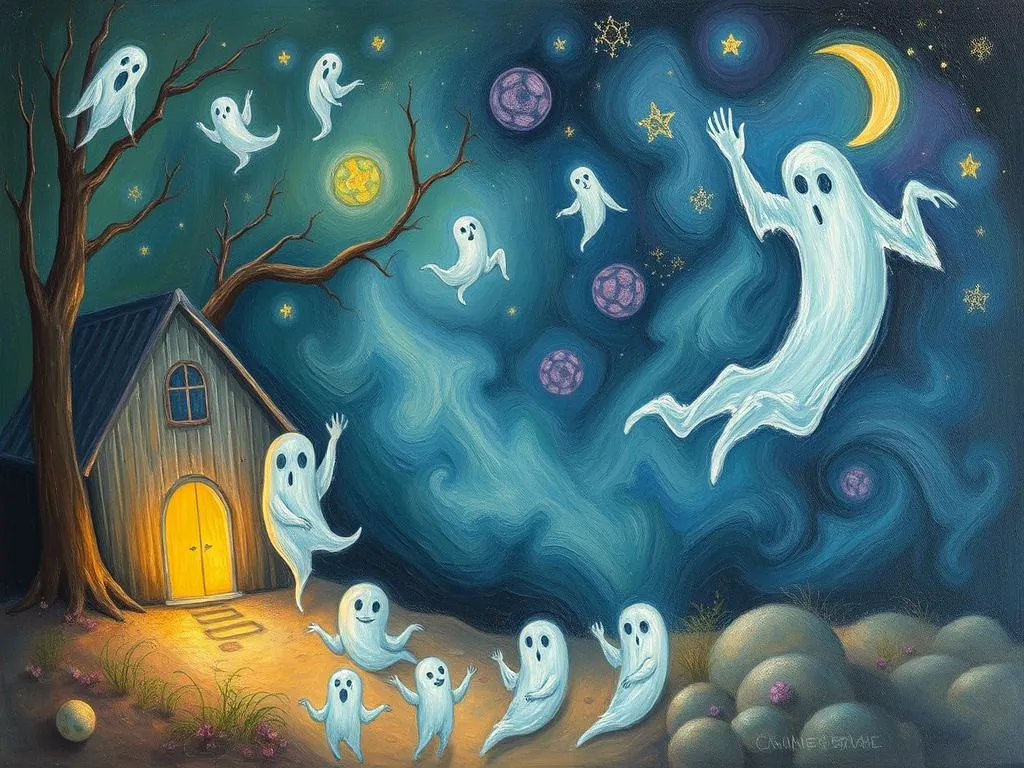
Introduction
Dreams of ghosts often evoke a range of emotions and interpretations, making them a captivating subject for both casual dreamers and those deeply interested in dream analysis. The presence of a ghost in a dream can stir feelings of fear, nostalgia, or even curiosity about unresolved issues from the past. These dreams resonate with the human experience, as they often reflect our struggles with loss, memory, and the lingering effects of experiences that have shaped our lives. Understanding the symbolism of ghost dreams can provide valuable insights into our subconscious, revealing hidden emotions and unresolved conflicts that seek acknowledgment.
Symbolism and Meaning
At the core of ghost dreams is the symbolism of the ghost itself. Ghosts are often seen as representations of the past, embodying memories, regrets, or unfinished business. They may symbolize fear of the unknown, or the influence of unresolved issues that continue to haunt us. When we encounter a ghost in our dreams, it can signify our subconscious grappling with something that we may not have fully processed in our waking life.
The appearance of a ghost can take many forms, each carrying its own unique significance. For instance, a friendly ghost may represent comfort and solace, suggesting that the dreamer has come to terms with a loss or that they carry fond memories of someone who has passed. In contrast, a menacing ghost could symbolize fear of confronting certain truths or emotions. This duality reflects the complexity of our relationships with those we’ve lost, ranging from love and warmth to fear and regret.
Moreover, the context in which the ghost appears plays a significant role in its interpretation. For example, if the dreamer feels a sense of fear or anxiety upon seeing the ghost, it may signify that there are unresolved emotional issues that need addressing. On the other hand, if the dreamer engages with the ghost in a calm or comforting manner, it could indicate acceptance and healing. This reflects the duality of human experience, where the past can be both a source of pain and a catalyst for growth.
The setting of the dream also adds layers to its meaning. A ghost haunting a familiar place could signify that the memories tied to that location are still affecting the dreamer. Alternatively, if the dream occurs in a strange or unsettling environment, it may highlight the dreamer’s feelings of being lost or disconnected in their waking life. Thus, understanding the dream’s environment is crucial in deciphering its true message.
Key Scenarios and Variations
Ghost dreams manifest in various scenarios, each providing a unique lens through which to interpret their meanings. One common variation involves the dreamer interacting with a deceased loved one. This type of dream often serves as a form of emotional processing, allowing the dreamer to reconnect with feelings of love and loss. In these instances, the ghost may convey messages of reassurance or forgiveness, suggesting that the dreamer is on a healing journey.
Another prevalent scenario involves a ghost appearing unexpectedly in the dreamer’s home. This can be particularly unsettling, as homes symbolize safety and security. A ghost intruding into this personal space may represent feelings of vulnerability or the intrusion of unresolved issues that disrupt the dreamer’s peace. It may be a call to address hidden fears or anxieties that have been lurking beneath the surface.
Additionally, dreams where the ghost is pursuing the dreamer can indicate feelings of being overwhelmed by past experiences or emotions. This scenario often suggests that the dreamer is running from something in their waking life that requires acknowledgment. It serves as a reminder that confronting these issues is essential for personal growth and emotional well-being.
Conversely, there are dreams where the ghost serves as a guide or mentor figure. In these cases, the ghost may represent wisdom from the past, offering insights into the dreamer’s current challenges. This variation highlights the importance of embracing lessons learned from past experiences, suggesting that the dreamer has the potential to grow by reflecting on those lessons.
Lastly, one might dream of becoming a ghost themselves. This scenario often reflects feelings of isolation, detachment, or a desire to escape from reality. It can indicate that the dreamer feels invisible or unheard in their waking life, prompting a need for connection and recognition. Such dreams encourage introspection about one’s current emotional state and relationships.
Real-Life Connections and Takeaways
Dreams of ghosts can serve as powerful tools for self-reflection and personal growth. To connect these dreams to real-life situations, it is essential to consider the emotions experienced during the dream and how they relate to waking life. Reflecting on the feelings of fear, nostalgia, or comfort that arise in ghost dreams can provide clues about unresolved issues that may need attention.
For instance, if a dreamer consistently experiences ghost dreams related to a specific person or event, it may indicate a need to address these unresolved feelings in their waking life. Engaging in conversations, journaling, or seeking closure can be effective ways to process these emotions and facilitate healing. Dreams often serve as a reminder that our subconscious is urging us to confront aspects of our lives that we may be avoiding.
Moreover, taking time to explore personal beliefs about death, loss, and the afterlife can enhance understanding of ghost dreams. Reflecting on how these beliefs influence emotions and behaviors surrounding loss may provide greater clarity on the messages conveyed in the dream. Understanding one’s own beliefs can empower individuals to navigate their feelings about loss and memory more effectively.
Additionally, creating a dream journal can be a valuable practice for those who frequently dream of ghosts. Recording the details of each dream—such as emotions felt, scenarios, and notable symbols—can help identify patterns and themes over time. This process encourages deeper exploration of the subconscious mind and fosters personal insight. By revisiting these dreams, individuals can gain a clearer understanding of their emotional landscape and the significance of their ghostly encounters.
It can also be beneficial to engage in conversations with trusted friends or professionals about these dreams. Sharing experiences can provide new perspectives and insights, fostering a sense of connection and support. In some cases, discussing dreams with a therapist may reveal deeper psychological themes that require attention.
Ultimately, the key takeaway from dreams of ghosts is that they can serve as profound reflections of our inner world. By embracing the emotions and messages they convey, individuals can embark on a journey of self-discovery and healing. Each ghostly encounter is an opportunity to confront what lies beneath the surface, fostering growth and understanding in the process.
In conclusion, dreams of ghosts invite us to explore the complexities of our past, acknowledge unresolved feelings, and seek closure. By understanding the symbolism, variations, and real-life connections tied to these dreams, we can unlock valuable insights into our emotional landscape. As you reflect on your own ghost dreams, consider the messages they convey and how they can guide you toward a deeper understanding of yourself and your journey. Remember, the past may linger, but it also holds the potential for growth and transformation.







